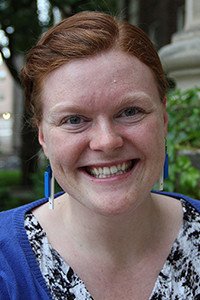Emily Pelton
Emily Pelton
Senior Lecturer
University of Minnesota
Host: Professor Michelle Driessen
General Chemistry Area Candidate
A pH buffer solution is an aqueous solution that contains a weak acid and its conjugate base (or weak base and its conjugate acid). When small amounts of acid or base are added, the pH of the solution changes very little. Buffer solutions provide a way to keep pH nearly constant in a wide variety of experimental and natural environments. For example, buffer solutions are often used to control pH when studying chemical reactions involving enzymes. In nature, the bicarbonate buffering system is particularly important, especially in the ocean. In this 20 minute mock lecture, Emily will teach how to calculate the pH of a buffer solution after the addition of strong acid and/or base.
Following the mock lecture, Emily will turn to a discussion focussed on her vision for how she might address observations of grade disparities between groups holding a variety of marginalized identities. Data demonstrating these disparities are consistent in introductory STEM courses at many institutions around the country, including the University of Minnesota and including general chemistry. Similar grade disparities are also found in subsequent courses. Emily will describe her vision of how to close gaps observed, with a particular focus on the large lecture modality (i.e., 200-350 students).
Emily Pelton
Emily Pelton earned her BA in 2008 from Gustavus Adolphus College in St. Peter, Minnesota, majoring in ACS Chemistry and minoring in Spanish. She continued her studies in chemistry at the University of Minnesota, earning her MS in 2010 and Ph.D in 2013. Emily has been teaching in the chemistry department at the University of Minnesota since 2013. As a teacher, she focuses on the undergraduate experience in a variety of introductory, general, and organic chemistry courses. Emily’s interests lie in the development and implementation of transformative learning opportunities in the curriculum, especially in terms of assessment strategies, grading structures, and course format. She has had the privilege to teach thousands of students and is continuously examining and improving her teaching and courses to maximize her students’ learning experiences. Emily has won awards from the University of Minnesota’s Center for Educational Innovation to create and implement a hybrid version of Introductory Chemistry, develop online quiz banks for Introductory Chemistry, and develop intentional learning communities in General Chemistry I. In her work to improve student learning outcomes, especially for underrepresented groups, she is currently engaged in the University’s pilot of ECoach, a tailored messaging system designed to help students succeed in large-enrollment gateway STEM courses.
